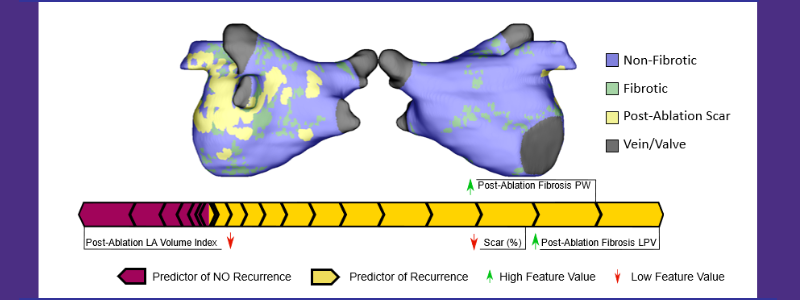
A patient specific cardiac model with a breakdown of the machine learning identified features which depict why this patient may have had recurrent atrial fibrillation after catheter ablation. Image by Savannah Bifulco
Five UW graduate students were selected for the 2022/2023 Bioengineering Cardiovascular Training Program (BCTP). Supported by a grant from the National Institutes of Health, the BCTP provides funding for predoctoral students interested in cardiovascular science and engineering to train under the guidance of mentors. The five trainees, all from bioengineering – Savannah Bifulco, Ariana Frey, Kerry Kao, Casey Kiyohara and Hao Zhou – will participate in a one or two-year program to enrich their research and support the future of cardiovascular-related research and technology development in the United States.
The holistic program gives students several opportunities to further their knowledge and grow their careers through immersive research experiences, clinical application and classroom instruction. Each student works in a BCTP faculty mentor’s lab and focuses on an aspect of cardiovascular physiology, pathology, development of therapeutic treatment, diagnostics and/or imaging. In addition to being mentored by a faculty member, trainees serve as mentors to an undergraduate researcher, high school student or community college attendee. Peer mentoring, within the program, is being developed as part of the curriculum as well as opportunities to interact with trainees of other UW programs.
Career development is an important aspect of the BCTP to ensure students are more successful and competitive in their future endeavors. Participants learn public speaking, scientific writing, manuscript preparation as well as fellowship and grant proposal writing. The program also covers commercialization and career options in industry and non-profit science. A clinical cardiac imaging preceptorship gives students the opportunity to rotate in clinics to assess if bioengineering approaches could assist the clinical systems. Many of the BCTP graduates have received fellowships, postdoc positions or both that were facilitated by skills gained in the program.
The BCTP is committed to diversity, equity and inclusion (DEI) and actively seeks diversity of backgrounds, perspectives and cultural experiences that will support an innovative and inclusive community of trainees. To further this goal, the participants engage in activities that support DEI through outreach, training and mentoring.
Established in 2004, the BCTP has been directed by UW bioengineering Professor Michael Regnier since that time. Recently, Ying Zheng, another UW bioengineering professor, was named co-director. They, along with program director Katie Dickinson and a steering committee, select trainees and monitor their training progress. Six UW departments participate in the program; bioengineering, chemical engineering, mechanical engineering, molecular engineering, pathology, physiology & biophysics.
Applications for autumn quarter 2023 program are now being accepted. To apply, please visit the BCTP website for details. Applications are due by 11:59pm, Sunday, June 18th, 2023.
Meet the current trainees:
 |
Savannah Bifulco (Boyle lab) is working on explainable machine learning for AFib: identifying risk factors and predicting post-ablation recurrence. |
 |
Ariana Frey (Zheng Lab) Is focused on stacking perfusable thick cardiac patches to promote anastomosis and cardiac regeneration in vivo. |
 |
Kerry Kao (Regnier Lab) is devoted to a subcellular investigation of the mechanisms of hypertrophic cardiomyopathy contractile dysfunction. |
 |
Casey Kiyohara (Thomas Lab) is studying SARS-CoV-2 and the mechanism for antibody-mediated entry into angiotensin-converting enzyme 2 (ACE2)-negative immune cells. |
 |
Hao Zhou (Scatena & Giachelli lab) is researching the molecular mechanism that leads to the crosstalk between cardiopulmonary bypass (CPB)-affected blood cells and endothelial cells which will be important to develop therapeutics preventing the injury to neonatal patients with congenital heart disease. |


